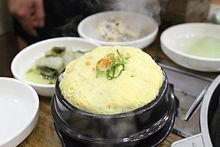Gyeran-jjim
 Gyeran-jjim boiled in a ttukbaegi | |
| Alternative names | Steamed eggs |
|---|---|
| Type | Jjim |
| Course | Banchan |
| Place of origin | Korea |
| Cooking time | 15 minutes |
| Main ingredients | Eggs |
| Ingredients generally used | Saeu-jeot or myeongnan-jeot, scallions, toasted sesame seeds |
| Similar dishes | Chawanmushi, Chinese steamed eggs |
| Korean name | |
| Hangul | 계란찜 |
|---|---|
| Hanja | 鷄卵- |
| Revised Romanization | gyeran-jjim |
| McCune–Reischauer | kyeran-tchim |
| IPA | [kje.ɾan.t͈ɕim] |
Gyeran-jjim (계란찜), Dalgyal-jjim (달걀찜) or steamed eggs is a type of jjim, Korean steamed dish.[1][2] It is a custardy, casserole-like banchan (side dish), often seasoned with saeu-jeot (salted shrimp) or myeongnan-jeot (salted pollock roe) and topped with scallions and toasted sesame seeds.[3][4][5] The ideal gyeran-jjim is light and fluffy.
Preparation and types
There are several ways to cook gyeran-jjim. It can be steamed, double-boiled, or boiled in a stovetop-safe crock on a very low heat. For faster cooking, some people microwave the bowl.
Eggs are sieved, and whisked with water until the mixture are completely blended in a cream-like consistency. Sometimes, kelp and/or anchovy broth is used in place of water for a richer flavor. Optional ingredients include mushrooms, peas, onions, Korean zucchini, carrots, and other vegetables for their own twist on the dish. The dish is then seasoned with saeu-jeot (salted shrimp), myeongnan-jeot (salted pollock roe), or salt, and optionally ground black pepper. Before being served, it is topped with chopped scallions or crown daisy greens, gochutgaru (chili flakes) or sil-gochu (shredded dry red chili), and toasted sesame seeds.
See also
References
- ^ "주요 한식명(200개) 로마자 표기 및 번역(영, 중, 일) 표준안" [Standardized Romanizations and Translations (English, Chinese, and Japanese) of (200) Major Korean Dishes] (PDF). National Institute of Korean Language (in Korean). 30 July 2014. Retrieved 20 February 2017.
- 주요 한식명 로마자 표기 및 표준 번역 확정안 공지. National Institute of Korean Language (Press release) (in Korean). 2014-05-02.
- ^ Philpott, Don (2017). The World of Wine and Food: A Guide to Varieties, Tastes, History, and Pairings. Lanham, MD: Rowman & Littlefield. p. 440. ISBN 9781442268036.
- ^ "gyeran-jjim" 계란찜. Doopedia (in Korean). Doosan Corporation. Retrieved 31 March 2017.
- ^ Delany, Alex (1 August 2016). "Here's Why You Should Be Steaming Your Eggs". The Huffington Post. Retrieved 31 March 2017.
- ^ Gold, Jonathan (8 January 2016). "What's looking good in the food world right now". Los Angeles Times. Retrieved 31 March 2017.
